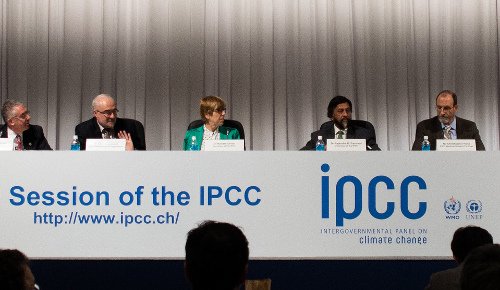This post is taken from Carlo Carraro’s Blog (published 03/03/15)
No one can dispute the influential role the Intergovernmental Panel on Climate Change (IPCC) plays in the climate change policy process. It informs the development of policy in an impartial and scientifically sound manner. However, as policy evolves, the IPCC’s operations are becoming increasingly unfit for purpose. The three main reasons for this are the cumbersome size of a low-cost organization, the problems it sometimes experiences when communicating key policy issues, and the huge effort, with little return, it requires of its participating academics. Seeing the need to reform the current IPCC design, twenty-four participants with experience with the IPCC met in Berlin for a three-day workshop on the 18-20 February 2015 to seek out solutions for the organization in which they place so much hope. The workshop (titled “Assessment and Communication of the Social Science of Climate Change: Bridging Research and Policy”) was co-organized by four academic and research organizations based in Europe and the United States: Fondazione Eni Enrico Mattei (FEEM, Italy), the Harvard Project on Climate Agreements (USA), the Mercator Research Institute on Global Commons and Climate Change (MCC, Germany), and the Stanford Environmental and Energy Policy Analysis Center (USA). Two of my co-organizers (Robert Stavins and Charles Kolstad) and I produced a memorandum summarizing our reflections of the Berlin talks. A comprehensive report will follow in the upcoming months. This meeting brought forth a series of improvements that would help the IPCC overcome the obstacles it currently encounters.
Cumbersome size
There are many researchers, policymakers, revisions and discussions involved in the production of IPCC reports. Of course scientific integrity and academic rigor are fundamental to trusted image that the IPCC maintains. However, this process often seems unnecessarily cumbersome. This has the direct effect of not only slowing down the output of information on climate science, but it disincentivizes the participation of leading climate scientists who feel this lethargic process is a misuse of their time. To counter this, the IPCC should reduce the number of meetings, prefer short and web-based meetings, improve the scoping process to better identify the relevant policy questions and elect its Chair and Co-Chairs of the Working Groups as early as possible in the assessment cycle so that the whole process can be guided and honed in consistently and from the first.
Making it policy relevant
Sometimes, the IPCC loses sight of the key climate policy issues that academics need to be on top of in order to inform the decision making process. There are a couple of ways we can work on this. First, there needs to be more dialogue between governments and scientists. This dialogue has to work both ways. The questions governments pose need to be answered. Equally, the issues scientists raise should be considered. This conversation would be greatly facilitated if the reports that the IPCC produced were more concise and accessible to policymakers. Second, the IPCC needs to diversify the experts it calls upon to inform its research. Notably, the inputs of social scientists (such as economists and international relations experts) need to be consulted in greater measure. However, this diversification extends beyond the disciplinary divide. Climate change involves and affects all countries. As such, the organization needs to create the opportunity for climate scientists from developing countries to be involved in the information producing process. Finally, the IPCC need not act alone. It would benefit from interacting with other institutions that review grey literature because this would allow it to address politically sensitive issues and draw on nuances that the mainstream research might not address.
What’s the impact so far?
These are some of the main points on the much-needed improvements to the IPCC process (see our memorandum for a more precise description). However, when the IPCC member countries held a plenary meeting on the 24-27 February 2015 in Nairobi to, in part, discuss the future of the IPCC, very few of these genuine concerns were addressed concretely. The press release from the meeting reveals minimal changes to the process. The suggestions to increase the accessibility of reports and improve the timing of their release were mentioned passingly. Greater commitments to diversity were emphasized most strongly, which is encouraging, but not enough.
This somewhat underwhelming outcome from Nairobi is especially disappointing when you consider that the IPCC is placed in a time for new opportunity and development: the Fifth Assessment Report is now concluded and there is a handover of management with Rajendra Pachauri stepping down, which would have happened later this year if not now. As such, the IPCC is well placed to introduce these changes for the new cycles of reporting without significant disruption. At this critical time leading up to the UNFCCC climate negotiations in December this year, we need to be making strides to ensure that our method of informing policy is as efficient and effective as possible.




